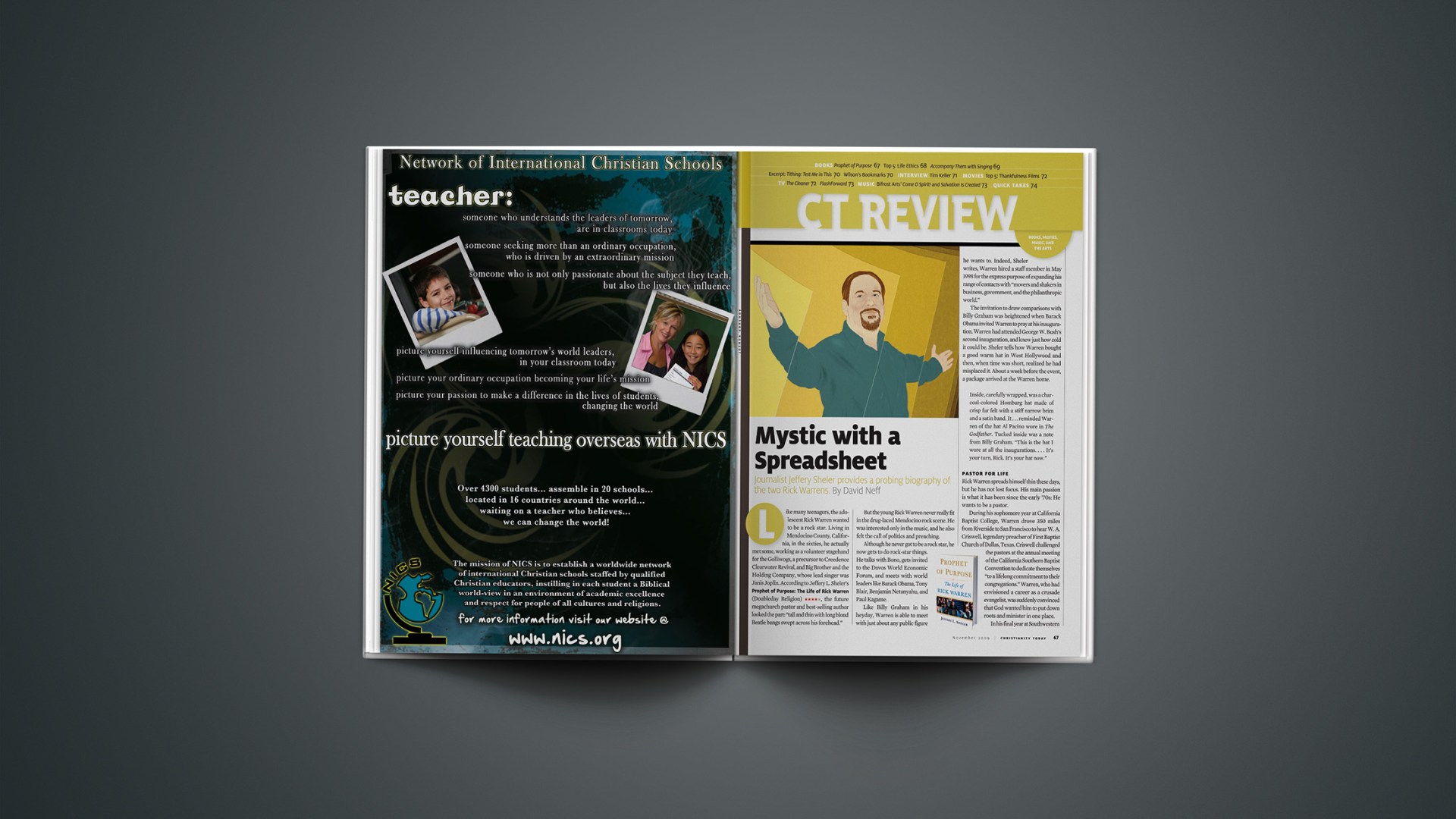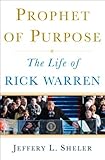Note: Christianity Today editor in chief David Neff and Prophet of Purpose author Jeffery Sheler will discuss Sheler’s new biography and the life and ministry of Rick Warren in a special online seminar Wednesday, December 2. Registration is free.
Like many teenagers, the adolescent Rick Warren wanted to be a rock star. Living in Mendocino County, California, in the sixties, he actually met some, working as a volunteer stagehand for the Golliwogs, a precursor to Creedence Clearwater Revival, and Big Brother and the Holding Company, whose lead singer was Janis Joplin. According to Jeffery L. Sheler’s Prophet of Purpose: The Life of Rick Warren (Doubleday Religion), the future megachurch pastor and best-selling author looked the part: “tall and thin with long blond Beatle bangs swept across his forehead.”
But the young Rick Warren never really fit in the drug-laced Mendocino rock scene. He was interested only in the music, and he also felt the call of politics and preaching.
Although he never got to be a rock star, he now gets to do rock-star things. He talks with Bono, gets invited to the Davos World Economic Forum, and meets with world leaders like Barack Obama, Tony Blair, Benjamin Netanyahu, and Paul Kagame.
Like Billy Graham in his heyday, Warren is able to meet with just about any public figure he wants to. Indeed, Sheler writes, Warren hired a staff member in May 1998 for the express purpose of expanding his range of contacts with “movers and shakers in business, government, and the philanthropic world.”
The invitation to draw comparisons with Billy Graham was heightened when Barack Obama invited Warren to pray at his inauguration. Warren had attended George W. Bush’s second inauguration, and knew just how cold it could be. Sheler tells how Warren bought a good warm hat in West Hollywood and then, when time was short, realized he had misplaced it. About a week before the event, a package arrived at the Warren home.
Inside, carefully wrapped, was a charcoal-colored Homburg hat made of crisp fur felt with a stiff narrow brim and a satin band. It … reminded Warren of the hat Al Pacino wore in The Godfather. Tucked inside was a note from Billy Graham. “This is the hat I wore at all the inaugurations …. It’s your turn, Rick. It’s your hat now.”
Pastor for Life
Rick Warren spreads himself thin these days, but he has not lost focus. His main passion is what it has been since the early ’70s: He wants to be a pastor.
During his sophomore year at California Baptist College, Warren drove 350 miles from Riverside to San Francisco to hear W.A. Criswell, legendary preacher of First Baptist Church of Dallas, Texas. Criswell challenged the pastors at the annual meeting of the California Southern Baptist Convention to dedicate themselves “to a lifelong commitment to their congregations.” Warren, who had envisioned a career as a crusade evangelist, was suddenly convinced that God wanted him to put down roots and minister in one place.
In his final year at Southwestern Baptist Theological Seminary, Warren mailed a questionnaire to the 100 largest churches in the country, wanting to discover what had made them successful. The churches varied widely in approach, but they had a few things in common, and to Warren the most important common factor was pastoral longevity. “Large healthy churches usually were led by pastors who stayed in one place for a long period of time.” When Warren’s research on megachurches reinforced his earlier conviction, he rededicated himself to pastoral perseverance.
Sheler portrays Warren as a Christian who discovers divine guidance in two complementary ways. The first is the divine voice speaking either in his heart or through a fellow believer. Warren told Sheler, “Early in my Christian life I had a hard time distinguishing between my thoughts, God’s thoughts, and thoughts that came to me from somewhere else …. But now that I’ve been a believer for 40 years, I’ve become more comfortable with it. The longer I walk with the Lord, the more I just know his voice.”
The empirical, analytical Warren meets the mystical, subjective Warren at key points in Sheler’s narrative.
The second way Warren discovers God’s will is through study. He loves to learn, to gather data, to categorize, to analyze. As an 11-year-old, he filled his room with “carefully arranged collections of rocks, shells, stamps, coins, chicken bones, horseshoes, and other treasured items.” Warren told Sheler that “what interested [him] most was not so much the collecting, but the sorting and categorizing, trying to figure out relationships between things, how they fit together.” As an adult, Warren says, he does the same thing with ideas.
The empirical, analytical Warren meets the mystical, subjective Warren at key points in Sheler’s narrative. For example, in the summer of 1979, when Warren was trying to decide where to plant a church, he spent weeks poring over U.S. Census data and other demographic material. When he found a report that identified California’s Orange County as the fastest growing county in the United States, and Saddleback Valley as the fastest growing part of that county, the discovery “grabbed [him] by the throat and made [his] heart start racing.”
As he recounted the event in The Purpose Driven Church, “As I sat there in the dusty, dimly lit basement of that university library, I heard God speak clearly to me: ‘That’s where I want you to plant a church!'” This intersection of empirical data and mystical experience was confirmed when Warren wrote to Herman Wooten, the Southern Baptist director of missions for Orange County, to ask about the need for new churches in that area, and Wooten simultaneously wrote to Warren inviting him to consider starting a church in Saddleback Valley. Their letters crossed in the mail, and both were convinced of God’s guidance.
Marriage first, love later
Sometimes, however, that sense of guidance was not so rapidly confirmed. Consider Rick’s marriage to Kay Lewis. They met at Cal Baptist, but neither was particularly impressed with the other. Rick was one of the campus’s “bachelors to the rapture,” and didn’t see the point in dating a girl he wasn’t going to marry.
But in the fall of their sophomore year, he asked Kay out. On their second date, he popped the question. She prayed and felt God leading her to say yes. “I’ll bring the feelings,” she heard God say.
Rick’s proposal was based on his belief that he had heard a clear word from the Lord about Kay the previous summer, though at the time, he didn’t love her and kept this revelation to himself. Once they were engaged, though, Rick fell in love.
Unfortunately, the feelings were not mutual. On their wedding day, Sheler writes, they were “virtual strangers … about to descend into marital hell.” They returned from a disastrous honeymoon full of anger. The intense stress landed Rick in the hospital. They started seeing a therapist and racked up a $1,500 credit-card bill for the counseling. It worked. “MasterCard saved my marriage!” jokes Rick.
Through prayer and perseverance, the marriage survived and became good. But through the years, the Warrens have continued to seek periodic tune-ups with a marriage counselor.
Kay has been good for her pastor husband. Notably, it was she who awakened Rick’s conscience to the subject of HIV/AIDS and the need to coordinate ministry to Africans whose families and societies were being destroyed by the virus.
Prophet of Purpose exposes to public view many personal details of Warren’s upbringing, marriage, and ministry. But it is no titillating tell-all. Sheler has thoroughly researched his story and makes every detail contribute to the portrait of a righteous preacher who lives by faith, struggles against physical, emotional, social, and political obstacles, and is determined to be a good steward of his gifts and influence. Sheler, for many years the primary religion writer at U.S. News & World Report, delivers a solid journalistic biography that is a pleasure to read.
David Neff is CT editor in chief.
Copyright © 2009 Christianity Today. Click for reprint information.
Related Elsewhere:
Prophet of Purpose is available at Amazon.com, ChristianBook.com, and other book retailers.
An excerpt of the book about Rick and Kay Warren’s marriage also appears today on our site.
Alan Wolfe reviewed Prophet of Purpose for Slate. Amy Sullivan reviewed it for Washington Monthly.











